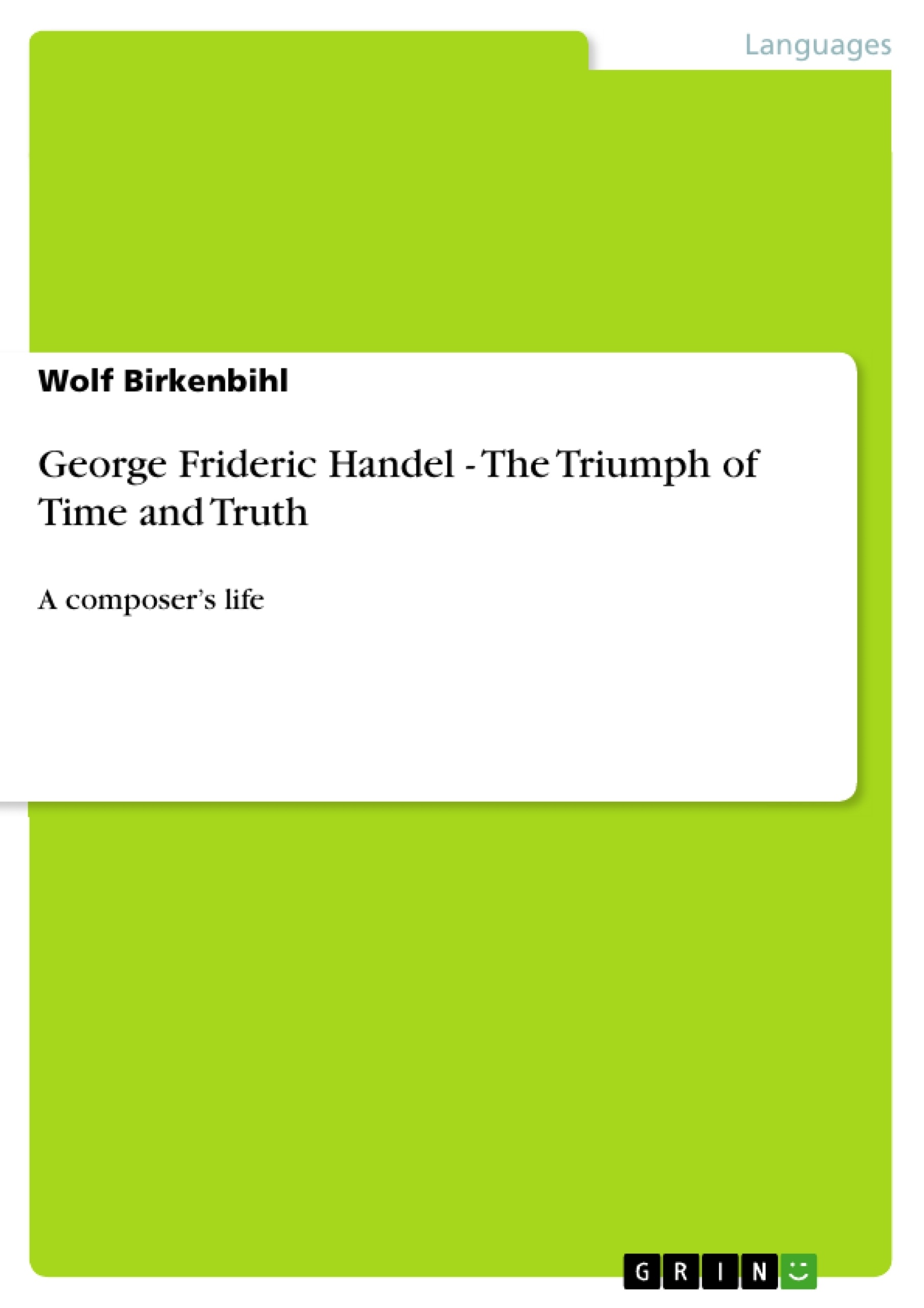The script “The Triumph of Time and Truth” deals with life and career of George Frideric Handel starting with his early years in Halle, Handel’s birth place, where he already got into music as a little boy by secretly playing a small clavichord on the attic.
At Weissenfels, the court of the Duke of Saxony, the budding spirit of the ten year old firstly became obvious to an audience listening.
His friendship with George Phillip Telemann led him to Hamburg at the very beginning of the 18th century. Here his genius became already visible and he began to develop his own particular style of composing operas which remained so significant for him for decades.
In Rome, his next domicile, it was the oratorio beside the opera he focused on. The time he spent in Italy was most formative for his further personal development.
The main focus of this script is on Handel’s London years from 1711 to 1759 where his career reached its peak. Here it was that his entirely new creation, the English oratorio became such a great success. This almost half a century brought glory, crisis and wealth to George Frideric Handel.
Inhaltsverzeichnis (Table of Contents)
- Scene 1
- Scene 2
- Scene 3
- Scene 4
- A further important incident takes place at Weissenfels, the court of the Duke of Saxony, around 1696.
- Scene 5
- Scene 6
- Scene 7
Zielsetzung und Themenschwerpunkte (Objectives and Key Themes)
This script narrates the life and career of George Frideric Handel, starting with his early years in Halle and following his musical development through his time in Hamburg, Rome, and ultimately his peak in London. The script aims to highlight the defining moments and influences that shaped Handel's musical genius, showcasing his evolution as a composer and the impact of his work on the musical landscape of his time.
- Handel's early musical inclination and the challenges he faced in pursuing it
- The development of Handel's unique style of composition, particularly in opera and oratorio
- The rise of Handel's popularity in London and the creation of the English oratorio
- The social and artistic context surrounding Handel's work, including both support and opposition
- The enduring legacy of Handel's compositions, particularly the "Messiah"
Zusammenfassung der Kapitel (Chapter Summaries)
Scene 1 introduces the composition of the "Messiah" in Handel's Brook Street study, highlighting the dedication and intensity of his creative process. Scene 2 describes the premiere of the "Messiah" in Dublin, emphasizing the impactful reception of the work.
Scene 3 focuses on the immediate aftermath of the premiere and the widespread acclaim the "Messiah" received. Scene 4 returns to Handel's childhood in Halle, highlighting his early fascination with music and the obstacles he faced in pursuing his passion.
Scene 5 details an encounter with Handel's father during a journey to Weissenfels, emphasizing the young Handel's determination and the influence of his environment on his musical development.
Scene 6 describes Handel's first encounter with the organ in the chapel of the court of the Duke of Saxony, marking a significant step in his musical training. Scene 7 depicts Handel's performance for the Duke of Saxony, showcasing his talent and the recognition he received at a young age.
Schlüsselwörter (Keywords)
This script focuses on the life and work of George Frideric Handel, exploring key themes such as musical development, the influence of cultural contexts, and the creation of significant compositions like the "Messiah". It explores Handel's journey from his early years in Halle to his rise to fame in London, encompassing the evolution of his musical style and the challenges and opportunities he encountered along the way.
Frequently Asked Questions
Where did George Frideric Handel's musical journey begin?
Handel was born in Halle, where he secretly practiced music as a child before his talent was recognized at the court in Weissenfels.
What was Handel's major contribution during his London years?
In London, Handel reached the peak of his career by creating the English oratorio, including his most famous work, the "Messiah."
How did Handel's time in Italy influence his style?
His years in Rome and other Italian cities were formative for his development in composing operas and Italian-style oratorios.
Who was a significant musical friend of Handel in his early years?
His friendship with George Phillip Telemann led him to Hamburg at the beginning of the 18th century, where his genius became visible.
Where was the "Messiah" first premiered?
The "Messiah" had its highly successful premiere in Dublin before becoming a global musical legacy.
- Arbeit zitieren
- Wolf Birkenbihl (Autor:in), 2010, George Frideric Handel - The Triumph of Time and Truth, München, GRIN Verlag, https://www.grin.com/document/153311



